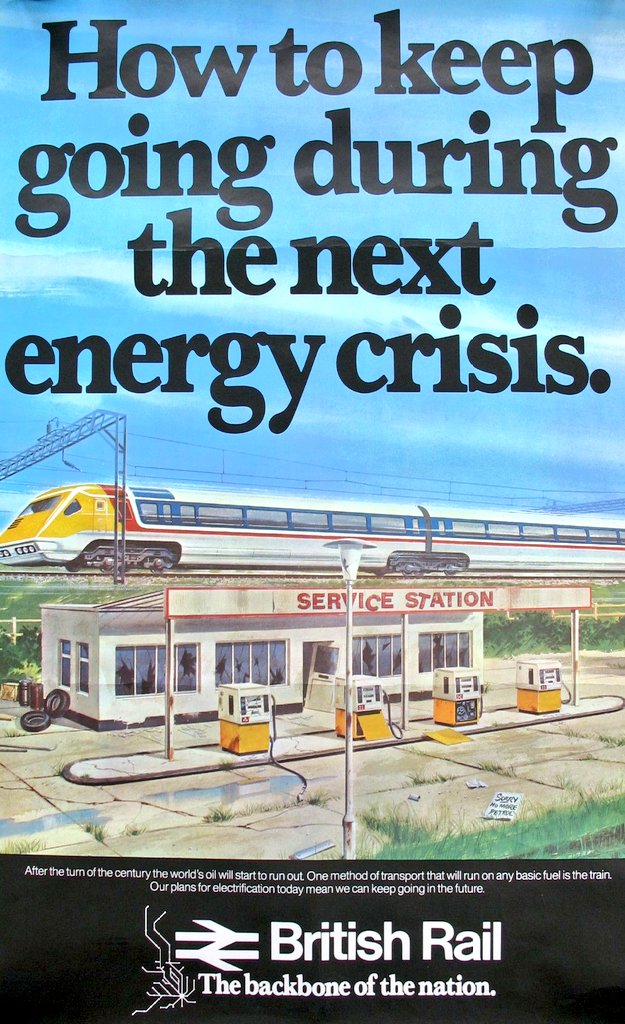How to Keep Going During the Next Energy Crisis


Much of what we are seeing – at a constitutional – economic and social level – is the long-tail of Thatcherism. Today – in the middle of the current crisis – the privatisation of energy and railways looks particularly unwise. The latter was specifically aimed at undermining the trade unions by shifting freight from rail to road. The truckers were the epitome of individual Thatcherites – and the consequences were environmentally disastrous.
The mantra was: rail bad / road good / public bad / private good.
What we are seeing now is the “just in time” delivery system falling apart.
According to Richard Seymour in: ” …the early 80s recession, the Tories had begun to propose privatisation as a potential panacea. Conservative MP Geoffrey Howe extolled the “discipline” of the marketplace. The emerging doctrine was that privatisation would make the large utilities more efficient and productive, and thus make British capitalism competitive relative to its continental rivals. In this period, the government sold off Jaguar, British Telecom, the remainder of Cable & Wireless and British Aerospace, Britoil and British Gas. The focus had shifted to privatising core utilities.
This policy did not emerge out of nowhere; it was fully embedded in the Hayekian ideas that had guided Thatcher and her cohort in opposition. But it did develop in relation to specific policy objectives. It was not just a question of stimulating private sector investment, but also of culture war intended to re-engineer the electorate along the lines of the “popular capitalism” vaunted by Thatcher, and announced in the infamous “Tell Sid” campaign.”
Thatcher’s privatisations came in waves as her political momentum gained momentum. Seymour again:
“Following the Tories’ third election victory, they were sufficiently confident to roll out their most aggressive privatisation programme yet. British Steel, British Petroleum, Rolls Royce, British Airways, water and electricity were among the major utilities for sale.”
The family silver was no fully sold. Deregulation followed privatisation like clockwork.


Tell Sid
All of this had a consequence far beyond Britain. In a homage to Thatcherism Chris Edwards writes on CapX: “The British Telecom (BT) IPO in 1984 was a mass share offering, which “did more than anything else to lay the basis for a shareowning popular capitalism in Britain,” said Thatcher. The government ran high-profile television ads to encourage the purchase of BT shares [“It’s good to talk”] and more than two million citizens participated in the largest share offering in world history to that date.
Selling the 250,000-worker BT was a bold decision, and its success generated momentum for further reforms. The OECD called the BT privatisation “the harbinger of the launch of large-scale privatisations” internationally.”
The social chaos unwinding on your forecourts and timelines is the long-term consequence of decades of privatisation, core industries run for profiteering with no thinking about the socio-ecological consequence. As people face mass fuel poverty the dark irony is that all of these “British” institutions were sold off by the Tories, now desperate to defend the very concept of Britishness they’ve sold.

Help to support independent Scottish journalism by subscribing or donating today.

Oil exploration, motor vehicle manufacturing and telecoms are pretty much privatised throughout Europe. The European nations are not experiencing the same disruption.
So it’s not necessarily capitalism, but Anglo-Saxon rent-seeking that’s the problem.
Indeed. And a lot of those European private companies own Scotland’s oil exploration, vehicle manufacturing, and telecoms industries. To say the problem’s an ‘Anglo-Saxon’ thing is anglophobic nonsense.
Aye Jacob,
Other European countries seem to be run more “for” the mass of people who live in them.
Ours is run more like a farm, or cruel children’s workhouse. A place where the “grown-ups” or “farmers” run things for their own immediate gain and to hell with the lumpen masses. Our class and patronage system passes societal benefits to the already wealthy by default.
I guess I am going to have to get round to reading Mariana Mazzucato’s The Entrepreneurial State: Debunking Public vs Private Sector Myths. But one additional point to make was that the Thatcher-era privatizations were all undersold, that is, they involved gigantic subsidies to private investors who scooped up state assets at bargain prices, leading to the impoverishment of the state, which then further struggled to invest in the public sector, making more public assets ripe for privatization. I don’t think this point is seriously contested, since it was pretty blatant. Obviously this completely distorts and makes unfair any comparison between the ‘efficiency’ and ‘innovation’ (etc) of public and private sector operations. And calls into question any Thatcherite integrity and faith in the market (if the market was so great and fair, why not sell properly-funded state assets to the private sector and wait for them to blossom?). Just like successive USAmerican administrations have shown zero faith in the market and complete faith in socialism when they imposed an illegal blockade on Cuba and threatened any countries wanting to trade with it, but I digress.
Essentially these offerings were massive bribes, but not necessarily intended to make the state smaller, as vicious Thatcherite centralisation, preparations for a police state and building up of British international arms trade demonstrated. Perhaps by driving masses of people into poverty, with faces rubbed in the opulent lifestyles of the establishment-favoured rich, a desperate attachment to gambling and casino-capitalism could be fostered. Slice society (yes, society) into hierarchical stratas of undeserving winners at the top and undeserving losers at the bottom, and you have your lawful evil empire running on envy and fear (you hope).
But as Ha-Joon Chang has pointed out (in the mythbusting 23 Things They Don’t Tell You About Capitalism), states can and do pick winners, on the whole with a better rate than the private sector (perhaps 9 out of 10 businesses go out of business in their first year in the UK historically, and many ‘successful’ businesspeople are actually serial failures, or derive their success from corrupt business practices). The point is, that the state has to bail out private failures of necessary utilities, and the public (and environment, and nonhuman life) have to endure the toxic effluence of the profitable, if entirely unethical, behaviour that is encouraged.
Plus, of course, Thatcher infamously shot Salter’s Duck with a dodgy dossier.
https://en.wikipedia.org/wiki/Salter%27s_duck
Tim Watkins has a longer view:
https://consciousnessofsheep.co.uk/2021/09/26/the-march-of-folly/
Surely much more the result of a combination of BREXIT, too low wages for HGV drivers many of whom have reached or are close to retirement and travel restrictions from Covid. the privatisation mantra is just too late and has littler relevance to this particular problem. Nor, if we are honest, were all nationalist industries always efficient. many e were overstaffed.
I’d rather have an “overstaffed” national rail company, NHS or steel company than an overstaffed House of Lords.
I think the point of the article is that the crises have highlighted the weakness of infrastructure which is always maintained at it’s lowest possible cost. It’s the way we do things here. If it’s for “the public” then it has to be cheap shite. Our leaders have cleverly created a nation which detests public spending, even though we ARE the public.
Good article Mike. James Marriot & Terry Macallister, in their excellent book, “Crude Britannia, How Oil shaped a Nation” argue that the sale of the Government’s majority shareholding in BP, championed by Labour Chancellor Denis Healey, became the trial run of the ‘privatisation rush’ pursued by the Tories (and continued under New Labour). I would commend that book to all, for much excellent background material on how we have ended up where we are today, including the pivotal role of the Oil Industry in importing a Neoliberal economic philosophy from the USA.